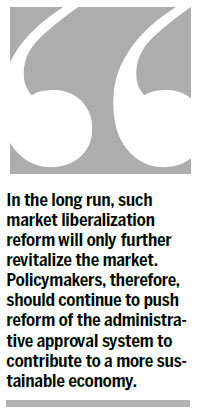Since then, 632 approval items, or more than one-third of existing items, have been abolished or transferred to lower-level governments, making it much easier to do business.
The achievement shows China is steadily stepping towards the goal of allowing a bigger role for the market and focusing the role of the government on social management and market regulation rather than being directly involved in market activities.
This is an unequivocal sign of the country's commitment to its institutional reform agenda. And reassuringly many local governments have been serious in implementing the central government platform.

In Zhejiang, for example, the provincial government has defined three lists of what can be done and what cannot - a negative list for business activities, a government power list and list for government fund use.
Based on those lists, people know what activities are forbidden and that all fields beyond those forbidden activities are accessible. The government, meanwhile, has also made itself bound to rule-based restrictions, making it less willful in the use of its various regulatory and fund use powers.
The clear demarcations of the three lists reduce the government's role in the direct distribution of resources, decrease its direct involvement in the micro-economy and prompt it to focus on the making of development strategies, plans, policies and standards, Li Qiang, governor of Zhejiang, told the Chinese press early this year. It will help promote fair market competition and build a clean government.
In Shandong province, some enterprises have revamped their corporate structure to cater to the changes in the approval procedures.
In Dawang township of Dongying city, an auto parts company has closed the department that was set up to apply for approvals because the procedure has become quite easy after the provincial government transferred some approval powers to the county and township authorities, according to a China Central Television report.
The reform of approval procedures is set to have a profound effect on the growth of the Chinese economy.
Statistics show that in 2013, the number of newly registered businesses reached 11.3 million, up by 19.6 percent year-on-year.
In the first half of this year, the number of employed people in private enterprises rose by more than 13 million, three times more than in the same period of 2013.
In the long run, such market liberalization reform will only further revitalize the market. Policymakers, therefore, should continue to push reform of the administrative approval system to contribute to a more sustainable economy.
The writer is a senior writer with China Daily. xinzhiming@chinadaily.com.cn

Today I chatted with my colleague. "Have you ever sent some gifts to your child’s teacher", he asked. "Never once", I answered firmly.